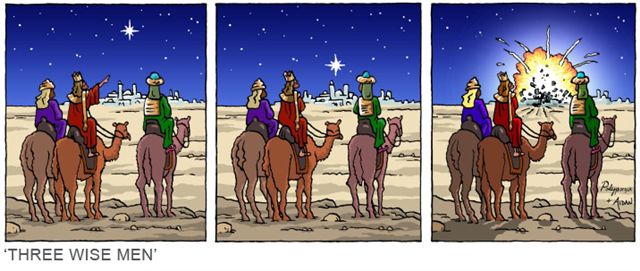Palestine ten years ago. Sadly it is relevant today but now with an
addition of a wall started in 2002, Bethlehem is isolated from Jerusalem and
has been reduced to only 13% of its original distriuct size]
(title inserted by editor, not the original title)
Boston Globe January 4, 2001
My parents tell me they feel lucky since the level of atrocities is still small compared to those faced by other places such as Ramallah, Gaza, Rafah, and Husan. A siege on all towns is also in effect, and the United Nations has warned of potential starvation. In some places (e.g. Hebron) curfews are in effect for weeks with no school, no work, and no supplies.
In these times of crisis and renewal, I reflected on the Palestine of Jesus' day. Like today, the picture in the Holy Land was less than idyllic 2,000 years ago. The similarities are astonishing: a brutal military occupation supported both by resources extracted from the natives and by funding and weaponry from the west, rulers using collective punishment against the inhabitants, grinding poverty of the natives, wealthy overlords using self proclaimed divine authority to do what they please, soldiers killing children, selfish collaborators, parents grieving over the loss of their children, attacks on houses of worship, and an organized public relations campaign to justify the atrocities.
Differences exist. Gunship helicopters and tanks are used today to bomb neighborhoods and kill individuals in lieu of Roman crucifixion or feeding them to the lions. And instead of public pronouncements by scribes, we have sophisticated media tools used to show that two undercover soldiers killed by a mob are more precious than the deaths of 150 Palestinian children and injuries to thousands. Blaming the victims for their own killing, the current occupier has produced a new logic. Instead of chariots, spears, and swords, the occupier has 400 nuclear weapons and a modern US-equipped army.
I also reflect on what Jesus recommended to his followers. Better yet, he set the example for them when he went into the temple grounds, turned the tables of the money-changers, and chastized those who have turned the house of the Lord to suit their own personal benefit.Americans today know very little about what is happening to their co-religionists in the Holy Land other than the distorted snippets seen on TV. Sure, the Catholic bishops issued a statement denouncing the excessive use of force by the Israeli Army, as did the World Council of Churches. They did this on the heels of similar reports from six human rights organizations.
But are words enough while the killing and oppression continue? Are words enough when our own US government gives money to Israel to continue its policies? Policies that include land confiscation, home demolitions, and construction of colonies and settlements? Policies that have resulted in a huge refugee problem? Cynically, Clinton proposes solutions that will set a precedent in implementing a forced peace without return of refugees to their homes. No Palestinian, Israeli, or American leader can sign away human rights, including the rights of refugees.
Words are not enough for a small group of Christians and Jews working in the occupied territories. A group called the Christian Peacemaker Teams sometimes put themselves in front of Israeli bulldozers to prevent the demolishing of Palestinian homes. This Christmas the group was in Beit Jala and Hebron. A group of Jews called the Israel Committee Against Home Demolitions is also working hard to protect Palestinians from the brutal Israeli policies.
For these initiatives to succeed, the US government should stop blaming the victims and join with the over 150 other governments calling for justice and implementing international law. We all would do well to remind our government that our tax dollars are better spent here at home rather than supporting Israeli apartheid policies.
This article VIA Desert Peace
The views expressed in this article are the sole responsibility of the author and do not necessarily reflect those of this Blog!



